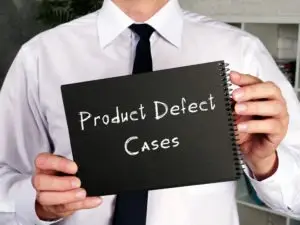
A product liability lawyer can help you determine if you have a valid claim for damages due to a defective product. Your lawyer will evaluate your case to determine if there is enough evidence to prove that your harm was caused by a defective product. If so, they will work on your behalf to get compensation for your losses and damages.
What Is a Product Defect?
When a product is defective, it means that the product has some kind of flaw or problem that makes it unreasonably dangerous to use. A product may be defective because of poor design, manufacturing errors, or a failure to warn consumers about potential dangers.
The most common types of products that cause injuries include:
- Automobiles, including parts and tires
- Power tools
- Pharmaceuticals and OTC medications
- Medical devices
- Workplace materials and substances
- Children’s toys
- Firearms and other weapons
A product defect can result in injuries to anyone using the product as intended (such as a child playing with an electric toy). However, they can also result in injuries to people who misuse or alter the product (for example, by modifying the wiring on an appliance).
In these cases, it is often difficult to determine whether there is actually a defect or whether the injured person was at fault for misusing the item.
Expect More, Receive More: Legal Support That Feels Like Family
What Is Product Liability?
Product liability in Florida is defined under Florida Statute § 768.81. It refers to a manufacturer’s responsibility for producing safe products. If a consumer is injured by a defective product, the manufacturer may be held liable for damages.
Product liability claims are very complex because they often involve multiple parties and theories of liability. For example, if someone is injured by a product, they may be able to recover damages from the manufacturer or retailer who sold the product, as well as from the designer or manufacturer of the component parts of the product.
Types of Product Defects
Product defects can take many forms. A product may have a general design flaw, or it may contain a specific manufacturing defect. A product may be missing key safety features, or it may be inherently hazardous to use.
Injuries from defective products are not limited to physical harm. If a faulty product causes illness, emotional distress, or mental anguish for consumers, they may have grounds for a lawsuit against the manufacturer.
The most common types of product defects are:
Design Defects
A design defect is an error in the original design of a product that makes it dangerous or unsafe to use. Design defects can be found in both consumer and industrial products, such as children’s toys, cars, microwaves, and medical devices.
A design defect is usually the result of a failure to account for foreseeable uses or conditions. The manufacturer may not have tested the product adequately before putting it on the market, or they may not have considered all possible ways in which consumers might use the item.
Manufacturing Defects
A manufacturing defect is an error made during the production process that causes a product to become defective and dangerous or unsafe to use.
A manufacturing defect can also occur when the manufacturer does not have adequate quality control measures in place or if they fail to properly inspect their finished products before putting them on the market.
For example, a screw might not be tightened properly during assembly, causing it to come loose during the operation of the product. Other examples include poor quality control standards or lack of testing before the release of a product onto the market.
Marketing Defects
Marketing defects refer to problems with how a product is marketed or advertised to consumers (such as labeling errors). If an oral contraceptive has misleading information about its effectiveness on its label, this would be considered a marketing defect because it could lead consumers to misjudge how effective its contraceptive method is at preventing pregnancy.
Faulty Manufacturing Process
When production takes place in a factory setting, mistakes are bound to happen from time to time. For example, if someone drops an object on the assembly line and breaks apart, it could end up in your finished product if not caught quickly enough by quality control inspectors.
Maybe your supplier used substandard materials in production because they were cheaper than what was originally planned for use in your product development phase (and you didn’t know about it). Either way, the faulty manufacturing process is a common cause of lawsuits against manufacturers.
Defective Packaging
An issue such as this may arise during shipping. The packaging may break open if there is something sharp sticking out from the bottom of the box.
Depending on how this situation unfolds, your product may be damaged or ruined before it reaches your customers. Consumers may want to return their purchases or request a refund (which will cost you).
How does a Lawyer Help Victims of Product Defects?
Product defects can cause serious injuries, including brain damage, amputation, and wrongful death. If you have been injured by a defective product, you may be able to recover financial compensation from those responsible for producing or marketing the item.
A lawyer can help you get medical care and recover losses stemming from your injuries. But if you want to collect the maximum compensation you can get, you need to work with an attorney who’s familiar with consumer protection laws and product liability in Florida.
At Viles & Beckman, our attorneys have extensive experience handling defective product cases. And we can help you understand your rights and get the compensation that you deserve by holding the negligent party liable. If you have been injured by a defective product, you need to contact us as soon as possible.
Call or text (239) 334-3933 or complete a Free Case Evaluation form



